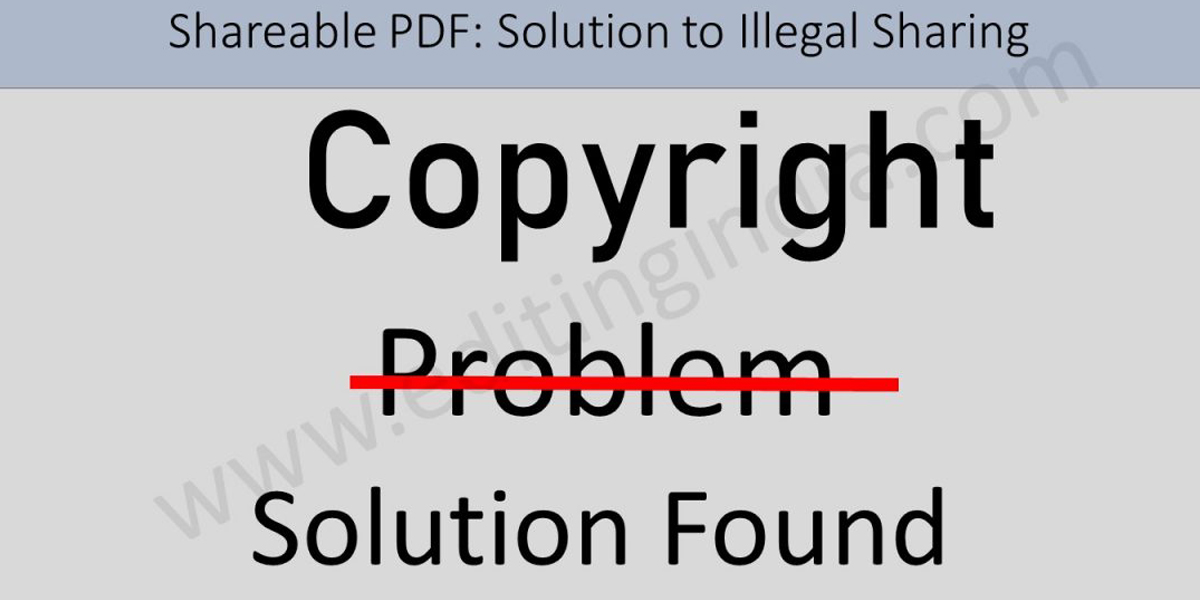Copyright is a crucial issue involving research data. Researchers, their employers and funders, and other researchers seeking to reuse the research data often raise questions regarding sharing of intellectual property in the form of published articles and other means. Some of the common questions include what are copyrights; who has these rights; and how does one use them to share data and thus encourage the productive downstream use. Several problematic incidents in the past have made it essential to find a viable solution to the copyright problem of publishing works. Illegal sharing is most prominently observed in peer-to-peer (P2P) sharing networks. As this affects not only the research and publishing-related communities but also the artist industries, such as music and theatre, many entities have made efforts to resolve to the problem of illegal sharing. The content flat-rate and the appropriate use of P2P networks have been proposed to avoid illegal sharing of content. However, implementation of these solutions requires substantial efforts. Kudos, an award-winning company that maximizes the reach and influence of scholarly publications, has recently announced a solution to this problem; that is, sharable PDF.
What is copyright?
Copyright is a set of exclusive rights granted to the creator of a work of an original work authorship. These rights include the right to make copies, publish or publicly display a work, perform a work, and create derivative works from it. A variety of works, including published writings and literature, visual art, music recordings, and movies, can be copyrighted, whereas several things, such as names, facts, and ideas, cannot be copyrighted. However, for some specific instances, these factors can be protected by other types of intellectual property, such as trademarks and patents. Thus, every research paper or its draft becomes copyright protected when it is saved to a hard drive by the author.
Copyright confines how others can use the paper. One cannot legally post a research manuscript on a website, share it in a journal, or partially use it as a part of his/her own research unless and until the copyright holder’s permission is obtained. However, similar to any other property, one can license others to use a copyrighted work. Moreover, copyright holders can sell or give away their work. Therefore, while publishing a work, understanding what you are granting the journal is essential, a copyright transfer or a license. If it is the license, then one must check the license terms.
What is the sharable PDF solution?
This shareable PDF solution, launched by Kudos, can assist publishers in avoiding copyright infringement and reclaim the lost usage from sharing of research on scholarly collaboration networks. For articles published by publishing entities, namely the American Thoracic Society, Emerald Publishing, the Federation of American Societies for Experimental Biology, and the Institution of Engineering and Technology, authors can use the sharable PDF solution of Kudos to generate summary PDFs of their articles and upload them on research-related sites such as ResearchGate and Academia.edu. These summary PDFs include links that direct you to the full text available on the publisher sites. This method produces a record of the author’s work at multiple locations, and simultaneously consolidates and measures the usage of a specific work at a single place. Moreover, this method is advantageous to publishers because it increases the usage of their site and provides superior information regarding the most commonly used networks and the most active users. According to a recent study, explaining and sharing through Kudos takes on average 10 minutes and leads to 23% more growth in full-text downloads.
Charlie Rapple, Sales and Marketing Director and co-founder of Kudos quoted, “This is a simple, pragmatic solution to a huge and accelerating problem for many publishers. It’s also a solution that benefits authors – ensuring they can continue to gain from network visibility, without ever having to worry about copyright again. By posting a customized summary, researchers can help a broader audience, including other researchers, find and understand their work. And for the first time, through Kudos, authors will be able to track and compare interest in their publications across different scholarly collaboration networks. This is all part of our focus on helping researchers make the best possible decisions as to where to invest their precious dissemination time.”
In summary, shareable PDFs offer a simple yet efficient solution to the illegal sharing issue of copyright content.
References:
1. Kudos launches solution to illegal sharing of copyright content

